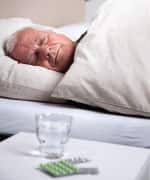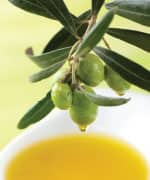Life Extension Magazine®
Blood Pressure Medicine More Effective when Taken at Night

What time of day a patient takes blood pressure medicine can have an impact on its effectiveness, according to a study published in the European Heart Journal.*
In the Hygia Chronotherapy Trial, researchers looked at data from more than 19,000 patients, comparing the results of people who took blood pressure drugs in the morning to those who took them at night.
Patients were followed for an average of more than six years, during which their ambulatory blood pressure was checked over a 48-hour period at least once a year.
Compared to patients who took their medication in the morning, those who took it at bedtime had better-controlled blood pressure and showed the following benefits:
1) 56% reduced risk of dying from heart or blood vessel problems
2) 49% reduced risk for stroke
3) 34% reduced risk for myocardial infarction
4) 42% reduced risk of for heart failure
5) 40% reduced need of coronary re-stenting
Editor’s Note: “Routine ingestion by hypertensive patients of [one or more] prescribed blood pressure-lowering medications at bedtime, as opposed to upon waking, results in improved [ambulatory blood pressure] control…and, most importantly, markedly diminished occurrence of major cardiovascular disease events,” the study concluded.
*Eur Heart J. 2019 Oct 22. pii: ehz754.
Extra Virgin Olive Oil Benefits the Brain

Research conducted at Temple University’s Lewis Katz School of Medicine indicates a brain benefit for supplemental extra virgin olive oil in older mice. The study was published in the journal Aging Cell.*
Previously, positive effects were found for olive oil in mice that were genetically engineered to develop the amyloid deposits that characterize Alzheimer’s disease.
The new study evaluated the oil’s effects in mice engineered to develop defective tau proteins in the brain which block the communication of brain cells in Alzheimer’s disease. “Remarkably, tau pathology strictly correlates with the severity of dementia,” the authors stated.
Beginning at six months of age, until the age of one year, the mice were fed a diet either with or without extra virgin olive oil. At the end of the study, mice that received the olive oil demonstrated better memory and cognition in comparison with the control group of mice, as well as a reduction in harmful tau deposits.
Additionally, treated animals’ synapses, which are the connections between brain cells, showed increased activity.
Editor’s Note: Olive oil is known for its many health benefits, including an ability to help protect against cardiovascular disease and mild cognitive impairment.
*Aging Cell. 2020 Jan; 19(1): e13076.
Lactoferrin Boosts Immunity to Fight Cancer

Lactoferrin has numerous anti-cancer activities.
One key way it helps prevent the development of cancer and inhibit cancer growth is by boosting the body’s adaptive immune response, according to a study published in the journal Biomolecules.*
Adaptive immunity, also called acquired immunity, is an immune response to a specific pathogen that enhances the body’s response to future encounters with that pathogen. For example, it’s what prevents a person from contracting the measles after they’ve already had it.
In addition to boosting adaptive immunity, lactoferrin works in the following ways to help combat cancer:
- It promotes cell proliferation and migration in healthy cells, while inhibiting proliferation and migration in cancerous cells.
- It crosses the blood-brain barrier, making it an ideal carrier for chemotherapeutics designed to treat brain tumors.
- It is highly bioavailable.
- It selectively targets cells involved in tumor proliferation, survival, migration, invasion, and metastasis.
Editor’s Note: According to the study authors, “The use of nutraceuticals as natural compounds corroborating anti-cancer standard therapy is emerging as a promising tool for their relative abundance, bioavailability, safety, low-cost effectiveness, and immuno-compatibility with the host.”
*Biomolecules. 2020 Mar 15;10(3).
Rise in Obesity-Related Cancers Seen at Younger Ages

Cancers associated with obesity, once typically diagnosed at higher rates in people over 65, are now on the rise in younger people, according to a study published in JAMA Network Open.*
Researchers studied more than 6 million cancer cases in the Surveillance Epidemiology and End Results (SEER) database from the years 2000 to 2016.
The results revealed a shift in obesity-associated cancers to people in both the 20-to-49-year-old age group and in the 50-to-64-year-old age group. The greatest increase occurred in the 50-to-64-year-old group.
In 50-to-64-year-olds, the increase in the number of obesity-associated cancers ranged from 25.3% in non-Hispanic white women to 197.8% in Hispanic men.
Editor’s Note: Obesity increases cancer risk by multiple mechanisms that include chronic inflammation, elevated glucose/fasting insulin and hormone imbalances. The authors of this study stated that “some of the greatest increases [were] observed for liver and thyroid cancers [in] all sex- and race/ethnicity- specific strata.”
*JAMA Network Open, 2019; 2 (8): e199261.
Even Light Physical Activity Increases Longevity

Increasing your amount of physical activity—regardless of intensity—can increase your lifespan, according to a study published in the BMJ.* Even light activity—such as walking or washing dishes—can have longevity benefits.
Researchers analyzed data from 36,383 adults with a mean age of 62.6 years. The data came from studies that tracked activity using motion sensors for up to one week, and that followed individuals for a median follow-up of 5.8 years.
The researchers categorized physical activity according to light, moderate, and intense, and they divided individuals according to most active and least active.
Results showed that the 25% most active people had a 60%-70% lower risk of death compared to the 25% least active people. Moreover, sitting for 9.5 hours a day or more (not counting night-time sleep) was tied to a statistically significant increased risk of death.
Editor’s Note: Government guidelines recommend a minimum of 150 minutes of moderate exercise or 75 minutes of vigorous exercise per week.
*BMJ. 2019;366:l4570.

